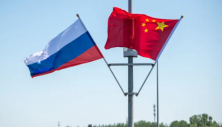24th December 2024.Lagos, Nigeria.Archbishop Alfred Adewale Martins, of the Catholic Archdiocese of Lagos, has enjoined all Nigerian leaders to be...
Vous n'êtes pas connecté
- English
- Français
- عربي
- Español
- Deutsch
- Português
- русский язык
- Català
- Italiano
- Nederlands, Vlaams
- Norsk
- فارسی
- বাংলা
- اردو
- Azərbaycan dili
- Bahasa Indonesia
- Հայերեն
- Ελληνικά
- Bosanski jezik
- українська мова
- Íslenska
- Türkmen, Түркмен
- Türkçe
- Shqip
- Eesti keel
- magyar
- Қазақ тілі
- Kalaallisut ; kalaallit oqaasii
- Lietuvių kalba
- Latviešu valoda
- македонски јазик
- Монгол
- Bahasa Melayu ; بهاس ملايو
- ဗမာစာ
- Slovenščina
- тоҷикӣ ; toğikī ; تاجیکی
- ไทย
- O'zbek ; Ўзбек ; أۇزبېك
- Tiếng Việt
- ភាសាខ្មែរ
- རྫོང་ཁ
- Soomaaliga ; af Soomaali
Rubriques :
 Maroc - EURASIAREVIEW.COM - A la une - 05/Jan 01:09
Maroc - EURASIAREVIEW.COM - A la une - 05/Jan 01:09
India Can Learn From Argentina’s Economic Turnaround – OpEd
By Mudit Jain Argentinean President Javier Milei is a self-described anarcho-capitalist, which means he supports replacing the state with free markets and private entities. He can also be described as a minarchist, supporting a “night watchman” state whose only function is to preserve its citizens’ safety and property rights. In simple words, for Milei, citizens should have the freedom and responsibility to support themselves through their own enterprise, both economic and social, with the state providing only military, police and law courts. As soon as he entered office in December 2023, Milei implemented shock treatment — much needed after years of hyperinflation and rampant taxing and spending led to low investment and capital flight. Let’s look at what he has achieved in one year since then. Under Milei, annualized inflation — which was over 200% a year ago — has come down to 166%. Because falling prices have a cascading effect, this trend will accelerate in the new year. BBVA Research projects that it will reach just 35% in 2025. Milei loosened tenancy laws, leading to an increase in the housing supply and drastically reducing rents. In February, Milei oversaw Argentina’s first monthly budget surplus in 12 years, a feat that he would go on to repeat throughout 2024, substantially decreasing the country’s default risk. The new president has achieved all this through drastic cuts in government spending and regulation, allowing the markets to perform the basic function of price discovery based on supply and demand. He abolished 13 ministries, slashed 30,000 government jobs and limited both the size and powers of the tax department. The results have been magnificent. There are still challenges of poverty reduction and unemployment but these are legacy issues and will take time to improve. With the current numbers, Argentineans are finally starting to feel some hope. India can learn from Argentina Could such policies improve the economy of India? After India’s independence in 1947, industrialization took off sharply under a mixed economy model. Rapid growth continued until faulty policies of excessive state control under Prime Minister Indira Gandhi (1966–1977 and 1980–1984) led to stagnation. In 1970, the per capita income of India, South Korea and China was around $270. In 2022, nearly 50 years later, that number was about $2,700 for India, compared to over $10,000 in China and over $30,000 in South Korea. Even Bangladesh has exceeded India in per capita, and India is now one of the poorest countries in Asia. Sure, India can technically claim to be the fifth largest economy in the world, with a fast growth rate of 7%, but the reality is starkly different the numbers are normalized on a per capita basis. Besides, with just as much veracity, India could call itself the world leader in the number of people living in poverty, in people suffering from blindness and in malnourished people. Corruption is endemic, government services at all levels are abysmal, trade deficits are huge, jobs are unavailable, and millions continue to migrate overseas both legally and illegally. The feudal mentality of the state continues as it did in colonial times; the impulse of policymakers is to make the state even bigger and the citizens even less empowered. One can hardly imagine how this would lead to improvement. Instead, we should take a cue from Milei’s philosophy of minimal state intervention. Less government spending would mean less incentive for corruption and less inflation. At the same time, deregulation would mean empowered, productive citizens enabled to create their own enterprises, raising GDP and lowering unemployment. Indians are natural entrepreneurs, after all; unleashing their latent energies would create a huge domestic market that would facilitate unlimited growth. It would be the golden age of India. Countries like China and Singapore have shown that state control can indeed grow the economy — if it is done responsibly and lawfully. Sadly, India has developed the worst habits of command economies without the benefits. The Indian administrative state is too corrupt to pull off a feat like China or Singapore. We are more like Argentina, and what worked there can work here too. India could be the poster nation of this new philosophy of placing the common citizen on top. The views expressed in this article are the author’s own and do not necessarily reflect Fair Observer’s editorial policy. About the author: Mudit Jain is third generation member of his family-owned company, which manufactures industrial chemicals. He has played an active role in various chambers of commerce. In addition to his business responsibilities, Mudit is actively engaged in various activities and organizations. Source: This article was published by Fair Observer
Articles similaires
A Brief Note On A Historic Proposal By Argentine President Javier Milei – OpEd
By Jesús Huerta de Soto The President of the Argentine Republic, Javier Milei, has stated that he is going to present a legislative proposal to...
In 2025, your vote is worth more than a song and dance
THE EDITOR: If one thing has defined this past year, it has been change – some desirable, some not. We have seen the upending of political...
Challenges And Opportunities For India In War-Torn Myanmar – Analysis
The unending war in North Myanmar between the Yangon-based military junta and the Ethnic Armed Organisations (EAOs) is posing a serious challenge to...
China Approves Construction Of Mega-Dam In Tibet
China is moving ahead with plans to build the world’s largest hydropower dam on Tibet’s longest river despite environmental, water security and...
The Progressive Authoritarian Tide Retreats – OpEd
Two months ago in the UK, a 17-year old girl with autism took the field in her all-women team for a match in a single-sex soccer league. She noticed...
PM’s New Year’s Day message: Live in hope, don’t submit to fear
THE Prime Minister has called on the nation not to submit to fear but work together to achieve the hope of a brighter future. Dr Rowley made this...
Nigerian Forest Security Service To Partner Soludo Against Insecurity
Weeks after the kidnap of Anambra lawmaker coupled with the abduction of an Anglican clergy and the killing of a Catholic priest as well as the...
Ukraine becomes ICC member state
On January 1, 2025, Ukraine became the 125th state to join the Rome Statute of the International Criminal Court (ICC) and, starting that date, will...
China increasingly supporting Russia’s war – expert
China is increasingly supporting Russia militarily, which poses a serious problem for Ukraine. This was stated by East Asia expert and Master's...
Les derniers communiqués
-
Adobe Brings Conversational AI to Trillions of PDFs with the New AI Assistant in Reader and Acrobat
Adobe - 21/02/2024
-
Laura Frigenti takes the Helm as Chief Executive Officer of the Global Partnership for Education
Global Partnership for Education - 05/12/2022





